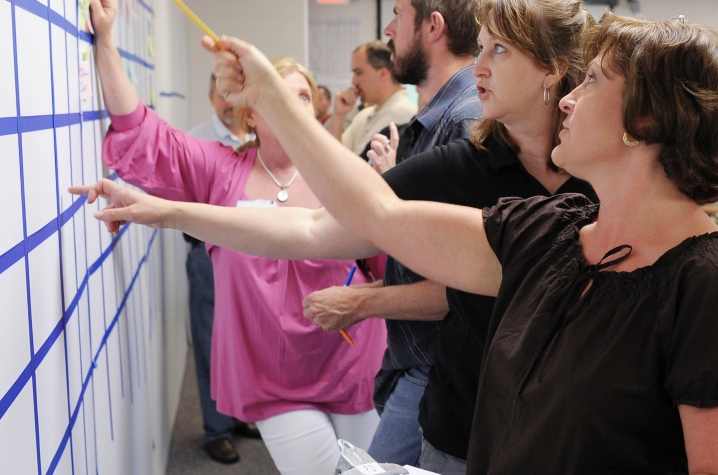Company Reaps Benefits from UK 'Lean Systems' Training
LEXINGTON, Ky. (Aug. 10, 2011) — The University of Kentucky Lean Systems Program has helped thousands of organizations in increasing efficiency, cutting waste and improving leadership by teaching a nine-phase lean implementation sequence. One of these companies, Lake Region Medical, has successfully completed and implemented phase seven of their program, and is actively engaged in developing phase eight.
"We would like to compliment Lake Region for their highly successful implementation of the true lean process," said Ken Kreafle, director of UK's lean program. "This success could only have been accomplished through the strong commitment of Lake Region's Lean Implementation Team."
Based in the UK College of Engineering, the lean program was developed as a university-industry partnership initiated by Toyota Motor Manufacturing, Kentucky in 1994. The intent of this partnership was to explore, study and teach the workings of Toyota's production system (TPS), also known as "lean systems." The overall concept of a lean system is to increase operational efficiency through systematic waste elimination. Introduced in the early '90s, this "train the trainer" program has become known worldwide, and UK's lean program has helped more than 2,000 companies nationally and internationally.
To learn the basics of true lean, UK offers a certification series which teaches students step by step how to facilitate a true lean implementation across any business process. Although originally focused on manufacturing, it has become apparent that lean principles can be applied to many other enterprises as well, such as the health care, service and food industries.
Those who attend these courses are instructed by qualified and experienced UK faculty and former Toyota employees on how to apply lean meaningfully within their departments, while giving participants the confidence and ability to raise the important questions, see the real problems, understand and avoid potential failure modes and most importantly, help leadership understand its key role in this transformation process.
"While many others teach only the whys and whats of lean, our program teaches people how to apply true lean in a way they can immediately use in their own processes," said Kreafle.
[IMAGE4]Kathy Jeurissen is director of Continuous Improvements at Lake Region, which is an international company based in Chaska, Minn., that leads in the development and manufacturing of OEM devices, as well as supplying the world's largest medical device companies with minimally invasive delivery solutions. Along with a few of her colleagues, Jeurissen traveled to Lexington to participate in the three-week lean certification series at UK, to see what a lean systems approach could do for their company.
The training took place one week per month, for three consecutive months. Between sessions, Jeurissen and her colleagues would go back to Minnesota where they would do various "homework assignments" at their company. This configuration meant less time away from home, and more time to absorb the material and explore it on their home ground. It also allowed for more opportunities to bring up questions and issues in later sessions.
In labs designed for the training, the group worked in a simulation factory, producing a product in a true lean environment. This allowed the team to participate in actual hands-on projects and apply their problem-solving skills.
"What we found to be highly beneficial was the emphasis on the 'one voice one system' philosophy, the importance of standard work, and lean's 'Eight-Step Problem Solving Methodology,'" she said.
After their initial training sessions were completed, UK's involvement did not end there. David Parsley and former Toyota employee Luther Cottrell, both from the UK lean program, traveled to Minnesota to provide additional practitioner training to two people from each of their main company sites.
Since participating in the training, Jeurissen says Lake Region has achieved many positive results. "It is no longer acceptable to solve problems solely from behind a desk or around a conference room table. We must go to the production floor to see what is actually happening and gather the facts," she said. "Our teams are also much better at finding the 'root cause' of a problem by using factual data to implement more efficient solutions, rather than exploring hypothetical reasons.
Jeurissen further says that Lake Region has put forth a greater effort to standardize their processes between all Lake Region facilities, and their groups are much better at communicating with each other, and no longer duplicate efforts.
"We not only work more efficiently and communicate better, but we have also made noticeable cost improvements. For example, in one of our projects the goal was to create additional floor space for a new product line. Our team was able to decrease the floor space in one of our departments by 50%. This department was originally located on two floors and by creating a better line balance and eliminating duplicated equipment, we were able to get everything on one floor. The department was able to produce the same amount of product in less space, with less equipment and fewer resources. These types of improvements allow us to reassign people to areas where they are needed and also gives us the opportunity to take on more product lines without having to hire people and take the time to train them."
The UK Lean Systems Program originally began working with companies in the manufacturing sector, but it soon became apparent that lean applies to almost any process: an assembly line, record keeping, patient handling, invoicing – there's no limit. That is when it branched into many other areas, including the UK Chandler Medical Center. In fact, faculty and staff from all over UK's campus have had lean training. Additionally, many College of Engineering faculty and administrators are participating in the executive leadership training.
"Our training on lean systems with UK gave us the sound foundation for our Continuous Improvement Program here at Lake Region," Jeurissen said. "The training we received helped us to develop our Continuous Improvement philosophy emphasizing the importance of attitude, knowledge, systematic problem solving, values/beliefs, and employee engagement. As we progress through our lean journey we appreciate the university's continued support, willingness to take our calls and offer guidance, and onsite training tailored to our company."
MEDIA CONTACT: Jenny Wells, (859) 257-5343 or Jenny.Wells@uky.edu










